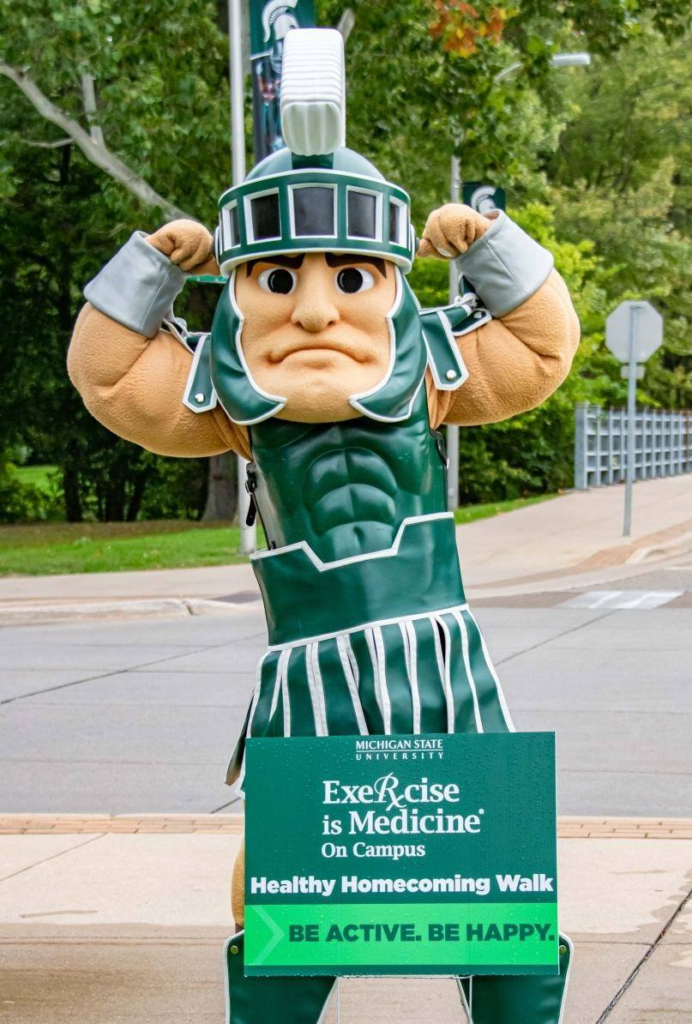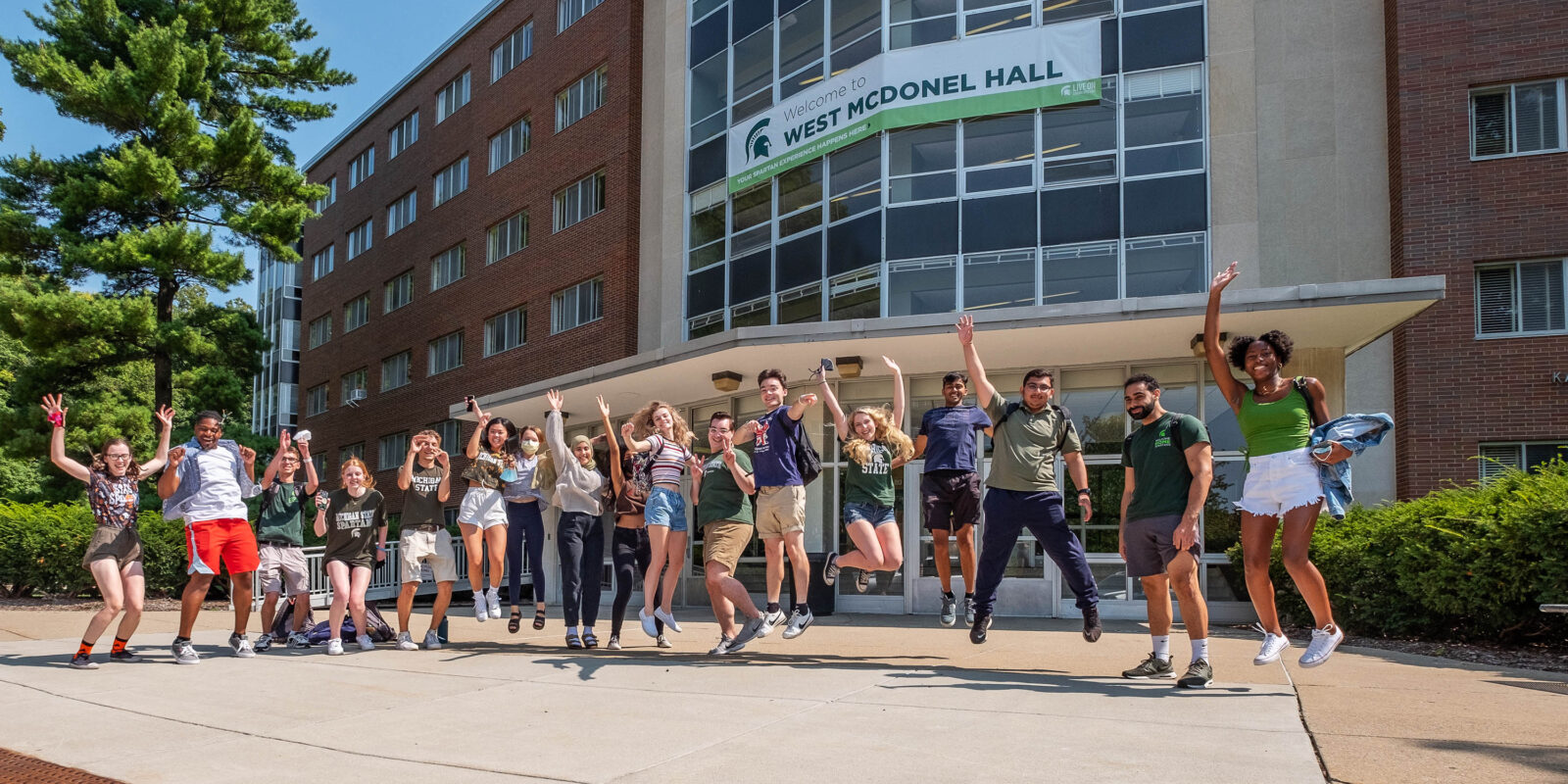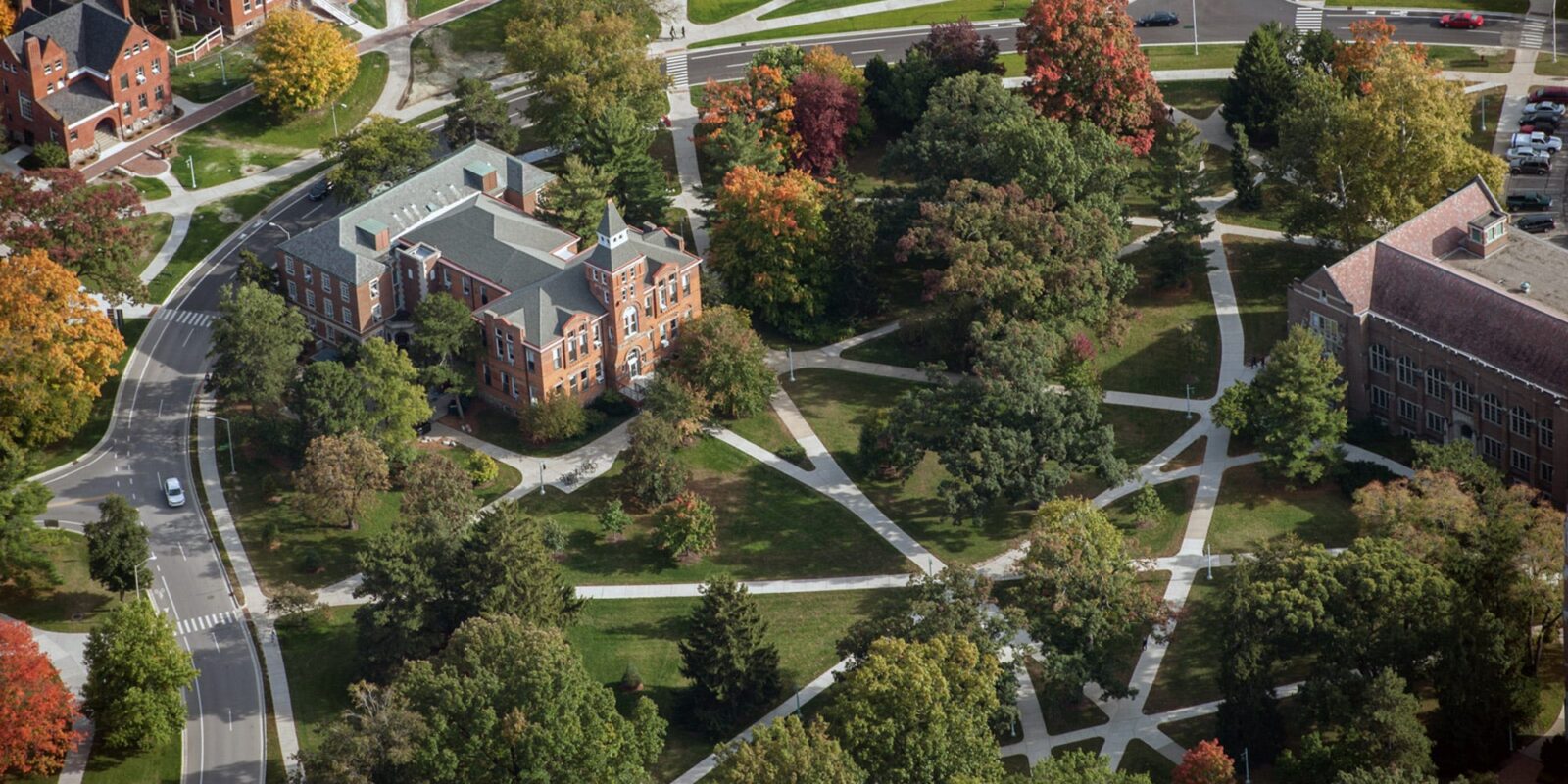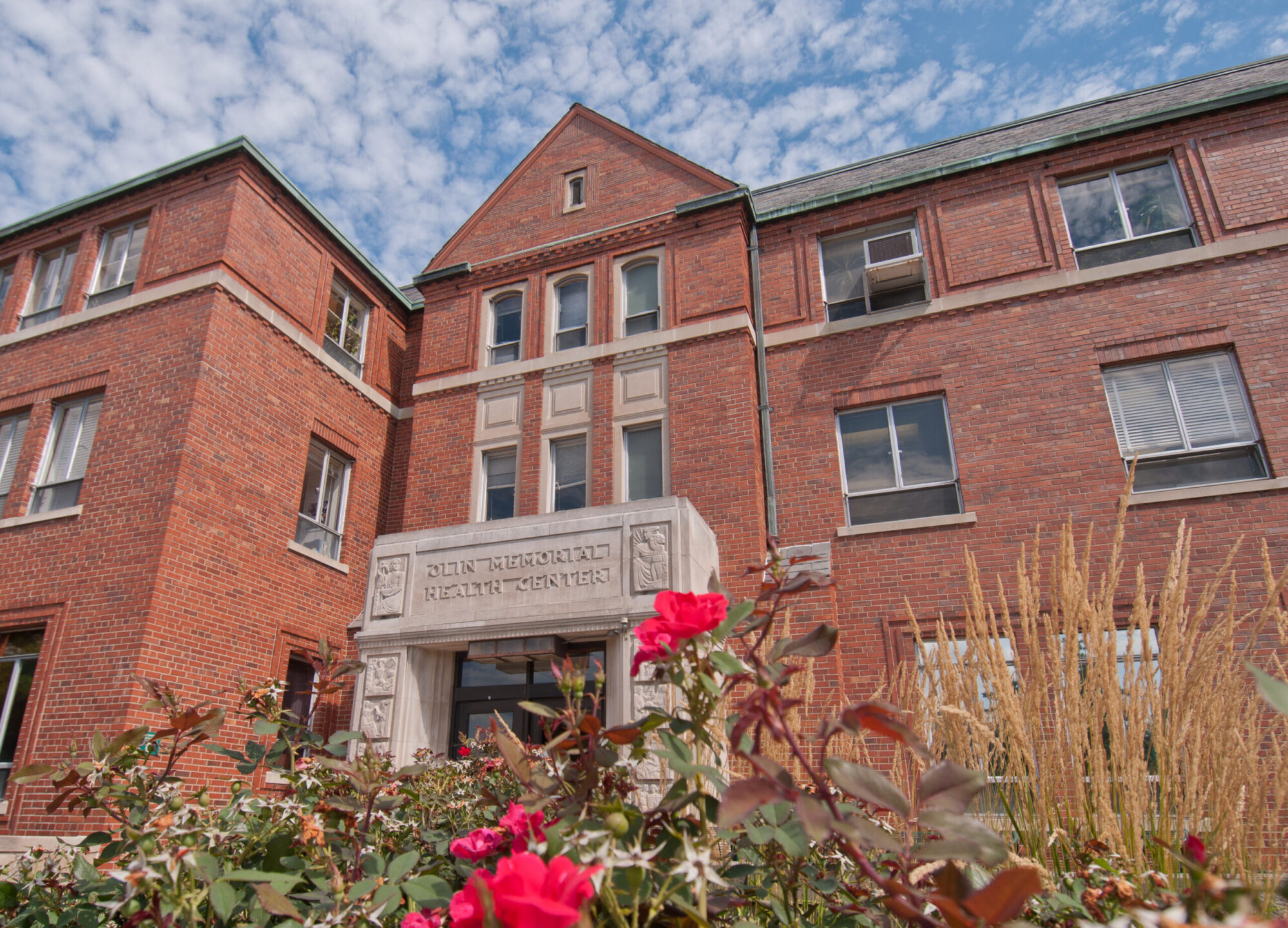Responsibilities of the Position
The executive director of mental health and trauma support services reports to the assistant provost/executive director of University Health and Wellbeing (UHW) and serves on the UHW senior leadership team. This position collaborates with university colleges, campus departments, and external partners; manages an annual budget of approximately $8 million; and directs 110 professional staff.
This position oversees the Mental Health and Trauma Support Services (MHTSS) pillar of the University Health and Wellbeing division, which provides mental health and trauma support services to students, staff, faculty, and the Michigan State University (MSU) community. Reporting to the executive director are Counseling & Psychiatric Services, the Center for Survivors, and the Employee Assistance Program. This leadership role focuses on implementing efforts to integrate mental health and trauma response services across the campus and community; partners with Campus Health Services, Human Resources, and other academic and student support services units; and develops programmatic and service enhancements to address the changing environment of regulations, technology, and delivery of mental health services. The new executive director will need to work closely with the Office of Diversity Equity and Inclusion, Office of Civil Rights, Student Life and Engagement Division, and community partners to support shared goals around the physical, mental, and social health and wellbeing of the MSU community. The executive director will also co-chair a new health and wellbeing committee for MSU.
Qualifications and Characteristics of the Successful Candidate
A master’s degree with at least 10 years of experience leading mental health and/or relationship violence and sexual assault services, programs, and/or initiatives with experience serving higher education, education, or community populations, particularly diverse populations of student age and adults is required.
The successful candidate will have experience conceptualizing, planning, implementing, and evaluating interventions and programming that is responsive to the needs and interests of diverse populations; experience working with concepts and theories of multicultural education, student development, socio-ecological model-based approaches, and health behavior changes; and experience and problem-solving skills in analyzing health promotion and wellbeing needs of emerging adults, especially college students. The ability to conduct needs assessments, experience with large complex organizations—such as universities, and the demonstrated ability to work across unit lines, including experience with developing and facilitating the work of collaborative teams will be important in the selection of the new executive director.
In addition to the qualifications stated above, key stakeholders identified the following capabilities and attributes of a successful candidate:
- A strong communicator who can communicate across the unit and across the institution to bring people together and implement systems change. Must be comfortable in a high-visibility role and able to talk to stakeholders at all levels of MSU.
- A collaborator who can build relationships with, and advocate for the services of MHTSS and the units of the University Health and Wellbeing division, vendors, local mental health providers, and the peer institutions of the Big Ten.
- A proven and tested leader with management experience at a large and complex organization who is able to lead at an intellectual and institutional level and operationalize the vision for MHTSS.
- An individual who can establish policies and procedures, analyze and employ data, possess a knowledge of best practices and standards in mental health care, and manage change processes.
- A leader with an understanding of diversity, equity, and inclusion (DEI) in health and mental health, who can speak to health inequities in underserved populations. The executive director must also have knowledge of social justice issues, particularly related to trauma.
- An administrator who can work to ensure budget alignment across units.
- A proponent of holistic physical and mental health who understands the wellbeing model and is able to integrate that model across the MHTSS units.

History of the Position
The executive director of MHTSS is a new position and is part of the newly formed division of University Health and Wellbeing. The division includes four pillars—three pillars relate to direct care: campus health services, health promotion and engagement and mental health and trauma support. The fourth pillar is the administrative unit for the division.
The MSU community has experienced several traumatic events over the last few years and this position will have a role in leading this unit to create a comprehensive and integrated strategy to address both prevention and identification of mental health issues throughout the university.
Opportunities and Challenges of the Executive Director Role
In transitioning to Michigan State University, the executive director of MHTSS will encounter the following opportunities, priorities, and challenges, as shared by key campus stakeholders:
- The executive director will have the opportunity to be part of a major university with a new vision for mental health and wellbeing on a college campus.
- The successful candidate in this inaugural role will be able to establish the MHTSS unit and lead the wellbeing, mental health, and trauma support work happening at MSU with a focus on prevention.
- The new executive director will join a strong team of leaders and professional colleagues throughout all pillars of the UHW division.
- Multiple administrative systems, policies, and procedures require a fresh pair of eyes from someone who can analyze, lead with a common path forward, and more strongly integrate the mental health and trauma units.
- A large, complex institution can be challenging and requires a leader who can build bridges, create clearer lines of communication, and understand the strategy of developing relationships across campus.
- Successfully addressing mental health and trauma of not just students, but the broader MSU community will require an innovative focus on services, delivery, and programming. Creating a program of prevention will put MSU at the forefront of this national challenge.
Measures of Success
The items listed below will define the new executive director’s success throughout the first year of employment:
- The MHTSS team is working together cohesively, professional development is prevalent, the vision for the team is clear, the staff feel empowered and satisfied, staff retention is high, and the executive director is viewed as a trusted leader.
- A listening tour is complete and priorities are being determined with input from all stakeholders, aligning with the goals and mission of the division and MSU.
- A unified team of unit directors provides robust support to their multiple constituents and works collaboratively to promote a strong sense of collegiality.
- MHTSS is known to be institutionally centered and the executive director is proactively involved in working with health services and health promotion in building a wellbeing culture around mental health on campus.
- Partnerships, programs, and other collaborative initiatives are occurring internally and externally, and the mental health and trauma unit is recognized for its partnership with Human Resources, Student Life and Engagement, Office of Diversity, Equity, and Inclusion among others in support of the mental health and wellbeing of the campus community.
- Communication is abundant and transparent (as appropriate), and campus constituents are aware of the programs and services available from MHTSS.
- Data is being gathered and used to inform the updating of policies and procedures throughout MHTSS.

Overview of the Mental Health and Trauma Support Services Unit
The Mental Health and Trauma Support Services pillar offers counseling, psychiatry services, advocacy, and support services. The unit provides mental health and trauma support services to students, staff, faculty, and other members of the MSU community. This pillar brings together different resources to enable increased communication and collaboration between the units that provide direct services to employees and students related to mental health and trauma. Mental Health and Trauma Support Services consists of the following resources:
- Counseling and Psychiatric Services (CAPS): Two separate units that merged five years ago, CAPS connects MSU students with the most appropriate and available care and services to optimize their health, wellbeing, and success. Services include individual and group counseling, crisis counseling, psychiatric care, and referrals to on- and off-campus services. The unit consists of 25 counselors/psychologists, six psychiatrists, two nurses, three social workers, and a crisis services team. CAPS is currently using Titanium and Athena databases.
CAPS serves all students on campus. Students complete an assessment online, followed by a 30-minute consultation, after which they are referred to the appropriate services. CAPS prioritizes access to services in order to reduce wait time. Last year, 4,500 individuals were served by counseling services and 900 by psychiatry services. Psychiatric treatment is not necessarily short-term. For psychiatric treatment, three free sessions are offered and additional sessions are billed through insurance. CAPS also has a training program for doctoral and master’s degree students, and post-master’s fellows.
- Employee Assistance Program: The Employee Assistance Program (EAP) is a confidential counseling service provided at no cost to all eligible MSU faculty, staff, retirees, graduate assistants, and their families. In 2023, EAP served 1,200 individuals with four counselors. Six free sessions are offered to each individual per event. Most individuals seen by the EAP counseling staff are referrals.
- MSU Safe Place: MSU Safe Place provides advocacy, emergency shelter, counseling, safety planning, information, and referrals to survivors of relationship violence and stalking. All services are free and confidential. Safe Place serves students, faculty, staff, and their spouses or partners. They serve non-MSU-affiliated community members when shelter space and staffing levels allow. Safe Place has five full-time staff. The off-campus shelter location is being torn down in 2024 with plans to build a new shelter in 2025.
- Center for Survivors: The Center for Survivors works with sexual assault survivors and others affected by sexual violence. The center provides free and confidential individual counseling, advocacy, and support groups to MSU students and the community. The center has 35 staff including nurses and on-call crisis staff.
The executive director of MHTSS, as part of the division of University Health and Wellbeing, must embrace the collective responsibility to advocate for the wellbeing of both students and employees. To guide the work, UHW has adopted the Inter-Association Definition of Wellbeing, which defines wellbeing as “an optimal and dynamic state that allows people to achieve their full potential.”
Purpose Statement
“UHW supports a university community with health and wellbeing equitably woven throughout all aspects of Spartan life, enhancing accessibility and safety through a culturally sensitive and holistic lens.”

Vennie Gore
get to know
Divisional Leadership
Vennie Gore is the senior vice president for Student Life & Engagement (SLE) at Michigan State University. He oversees all operations within the division of SLE and contributes to the oversight of MSU’s University Licensing Program as well as the Land Management Office. Among other notable accomplishments, Gore earned the 2016 Elizabeth A. Greenleaf Alumni Award from Indiana University and recently completed Harvard’s Institute for Educational Management.

Thomas D. Jeitschko
get to know
Divisional Leadership
Dr. Thomas D. Jeitschko is a professor of economics who serves as the Interim Provost and Executive Vice President for Academic Affairs at Michigan State University. He transitioned into this role from serving as the Senior Associate Provost, overseeing the budgeting process of the Office of the Provost, provost’s office communications and events, Institutional Research, and Institutional Space Planning and Management, as well as the Apple Developer Academy with MSU in Detroit and the Student Information System transition project. Previous to that he was MSU’s Associate Provost for Graduate and Postdoctoral Studies and Dean of the Graduate School, after serving for several years as the Director of the American Economic Association Summer Program—a two-month, intensive pre-doctoral residential program that prepares talented undergraduate students from under-represented backgrounds for graduate work in economics and related fields.
Dr. Jeitschko holds an advanced degree in economics from the University of Münster in Germany with a specialization in Economic History and a Ph.D. from the University of Virginia in 1995 with a specialization in Mathematical Economics. His research interests are in applied economic theory with concentrations in industrial organization, law and economics, and micro-economics more broadly. He has published in a wide variety of journals, including the American Economic Review, the International Economic Review, the European Economic Review, Games and Economic Behavior, Economic Theory, the Journal of Law, Economics, and Organization, and the Journal of Industrial Economics. He served as an associate editor of the Journal of Economic Behavior and Organization and the International Journal of Industrial Organization, and as an editorial board member of the Journal of Behavioral and Experimental Economics, in addition to holding several other editorial appointments.

Alexis Travis
get to know
Divisional Leadership
As the assistant provost/executive director of health and wellbeing, Alexis Travis oversees the university’s new university health and wellbeing division, which brought together 11 departments focused on supporting faculty, staff, and student health and wellbeing. Travis earned her doctorate in public health from Walden University and her master’s in pharmacy with honors from the University of Bradford in the United Kingdom.
Before joining Michigan State, Travis served as senior deputy director for the public health administration with the Michigan Department of Health and Human Services, overseeing the Bureau of Laboratories, Bureau of Epidemiology and Public Health, Bureau of Health and Wellness, Bureau of Infectious Disease Prevention, and the Office of Performance Improvement and Management. In 2021, she was recognized by the de Beaumont Foundation as a National 40 Under 40 in Public Health honoree.

Institutional Overview
Michigan State University has been advancing the common good with uncommon will for more than 169 years. A top global university, MSU pushes the boundaries of discovery to make a better world while providing students with life-changing opportunities. MSU ranks among the top ten public universities for education abroad, according to the U.S. News & World Report. Spartans work together as part of a vibrant global campus community, creating partnerships around the world and making a lasting impact from East Lansing to East Africa.
MSU’s top-ranked programs, high-quality opportunities, and a diverse, inclusive, and collaborative community enable more than 50,000 students to create personalized paths that prepare them to succeed and lead. MSU applies its vast knowledge and resources to create solutions in partnership with communities across the state and helps make Michigan a place of opportunity, economic growth, and innovation.
The MSU community includes more than 5,000 faculty and academic and support staff. The MSU alumni network is over 500,000 strong. MSU ranked 28th among public universities and 60th overall in U.S. News & World Report’s America’s Best Colleges 2024.
Mission
Michigan State University, a member of the Association of American Universities and one of the top 100 research universities in the world, was founded in 1855. MSU is an inclusive academic community known for its traditionally strong academic disciplines and professional programs and its liberal arts foundation. The university’s cross- and interdisciplinary enterprises connect the sciences, humanities, and professions in practical, sustainable, and innovative ways to address society’s rapidly changing needs.
As a public, research-intensive, land-grant university funded in part by the state of Michigan, MSU’s mission is to advance knowledge and transform lives by:
- Providing outstanding undergraduate, graduate, and professional education to promising, qualified students in order to prepare them to contribute fully to society as globally engaged citizen leaders
- Conducting research of the highest caliber that seeks to answer questions and create solutions in order to expand human understanding and make a positive difference, both locally and globally
- Advancing outreach, engagement, and economic development activities that are innovative, research-driven, and lead to a better quality of life for individuals and communities, at home and around the world
Land Acknowledgment
MSU collectively acknowledges that Michigan State University occupies the ancestral, traditional, and contemporary Lands of the Anishinaabeg – Three Fires Confederacy of Ojibwe, Odawa, and Potawatomi peoples. The University resides on Land ceded in the 1819 Treaty of Saginaw.
The Student Body
Total Enrollment: 51,316
Undergraduate: 40,483
Graduate: 7,780
Graduate Professional: 3,053
Male: 48%
Female: 52%
African American/Black: 6%
Asian: 8%
Hispanic/Latino: 6%
White: 64%
Two or More Races: 4%
Unknown: 2%
Non-Resident: 9%

Kevin M. Guskiewicz
get to know
University Leadership
Kevin M. Guskiewicz, a neuroscientist, academic leader, and concussion researcher, was appointed president-elect of Michigan State University on December 8, 2023, by the MSU Board of Trustees and started as president on March 4, 2024. Guskiewicz joined MSU from the University of North Carolina at Chapel Hill (UNC), where he served on the faculty since 1995 and as chancellor since 2019.
At UNC, he was founding director of the Matthew Gfeller Sport-Related Traumatic Brain Injury Research Center and the Center for the Study of Retired Athletes. He is a nationally recognized expert on sport-related concussions and maintains an active research portfolio, serving as co-principal investigator on two multi-center research grants. He has published more than 200 peer-reviewed papers in the areas of sports medicine and neuroscience.
His team’s groundbreaking work has garnered numerous awards and has influenced concussion guidelines in the NFL and NCAA. In 2011, Guskiewicz received the prestigious MacArthur Fellowship for his innovative work on the diagnosis, treatment, and prevention of sport-related concussions. In 2011, he convinced the NFL and NCAA to change the kickoff rule, which resulted in a 50 percent reduction in concussions on kickoffs. In 2013, Time magazine named him a Game Changer, one of 18 “innovators and problem-solvers that are inspiring change in America.”
Diversity Statement
“Michigan State University is guided by values that are embedded in our rich heritage as a leading land-grant university and our current position as a world-grant institution among the best universities in the world. Foremost among our values is inclusion.
At MSU we take great pride in our diversity. Valuing inclusion means providing all who live, learn, and work at the university the opportunity to actively participate in a vibrant, intellectual community that offers a broad range of ideas and perspectives. To benefit from our campus’ diversity, we must embrace the opportunity to learn from each other. At MSU we welcome a full spectrum of experiences, viewpoints, and intellectual approaches because it enriches the conversation and benefits everyone, even as it challenges us to grow and think differently.
Valuing inclusion benefits MSU scholars who advance knowledge by exploring the vast range of questions that result from our differences. It benefits our employees by creating a stronger work environment that draws on various points of view. And it benefits our students by enriching their learning experience and better preparing them to function as effective citizens. Employers and graduate and professional schools are seeking people who are culturally competent and have the skills to function in a global society. We all have the opportunity to gain these experiences and skills at MSU.
Our commitment to inclusion means we embrace access to success for all and treat all members of the extended MSU community with fairness and dignity. We recognize that cross-cultural interactions may sometimes create moments of surprise or discomfort. But when perspectives clash, we have an individual and shared responsibility to guard against behaviors that demean or otherwise harm individuals and our community. A strong campus community is characterized by respect for, and civility toward, one another.
Throughout the year, MSU provides opportunities for the campus community to share ways in which we can become more inclusive.”

Benefits Overview
MSU offers an extensive benefits package to its employees, including generous vacation and holiday time for 12-month employees. Click here to learn more about the different plans and types of benefits available to MSU employees.
Application and Nomination
Review of applications will begin immediately and continue until the position is filled. A resume with an accompanying cover letter may be submitted via the Spelman Johnson website at https://spelmanandjohnson.com/search-open-positions/. Applicants needing reasonable accommodation to participate in the application process should contact Spelman Johnson at 413-529-2895 or email info@spelmanjohnson.com.
The salary range for the position is $200,000 to $220,000 annually, commensurate with education and experience.

